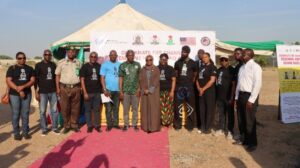Human capital development, improved welfare top agenda of 2024 Kwara budget
…As Governor, MDAs hold policy talks
Human capital development and improved welfare are top of the agenda on the proposed 2024 budget for Kwara State.
This was made known at a meeting on the policy direction for the state attended by Kwara State Governor AbdulRahman AbdulRazaq and other top officials to guide government’s ministries, departments and agencies (MDAs) for the 2024 budget.
The meeting was held in lieu of upcoming citizens’ budget engagements, which are due to begin shortly.
The Governor said the budget will prioritise the completion of the ongoing capital projects and inauguration of same to improve living standards and create more jobs for the people of the state, as well as on social protection to support the vulnerable.
He also said that the government will continue to prioritise the workers’ welfare, including making provision for discussions around the new minimum wage.
The Policy Direction hangout for Kwara State 2024 Budget Preparation was attended by Deputy Governor Kayode Alabi; Hon. Gabriel Ganiyu Abolarin, who stood in for the House of Assembly Speaker Rt. Hon. Yakubu Danladi Salihu; cabinet members led by the Secretary to the State Government (SSG) Prince AbdulKadir Aliyu Mahe; Permanent Secretaries; and directors of planning.
“In the new year, our focus will be to complete and inaugurate many of our projects, thereby creating jobs for the people. Workers’ welfare and social protection for the vulnerable will remain a top priority,” the Governor said.
“The government will also make provision for discussions around the new minimum wage. We will also strengthen our ease of doing business efforts through advocacies, legislations, and collaboration with all players in the economy.
“The direction of our administration has been clearly outlined in the Sustainable Development Plan (SDP: 2021-2030). The 10-year economic blueprint detailed our policy objectives and priorities. I urge every cabinet member and government official to familiarise themselves with this key document, along with a few others like the Agricultural Transformation Plan.
“Our projects, programmes, policy pronouncements, and other priorities as an administration have been inspired by the visions expressed in these documents. For that reason, the 2024 budget will be tailored to the same objective.
“On top of this agenda is human capital development which includes access to quality education, sanitation facility, infrastructural upgrade and expansion, improved and diversified economic base and revenue generation, strong fiscal base, youth empowerment, social protection, and gender inclusion, sustainable environment, sustainable energy, sports development, food security through promotion of smallholder and commercial agriculture, safety of lives and property, and create the right environment for capital investments.”
He charged all government officials in the state to act in their various duty posts in line with the current economic reality, as the government continues to meet obligations and impact the lives of Kwarans.
Prince Mahe, for his part, said the 2024 budget policy direction hangout was an important moment for the state to discuss the financial roadmap that will guide it in the coming year.
He encouraged all key stakeholders to engage in constructive dialogue and provide valuable insights in the course of deliberation on the budget.
Hon. Sabi, in his introductory remarks, said the event was aimed at providing step-by-step directions to make the 2024 budget preparation task easier and implementable.
He thanked AbdulRazaq for his outstanding leadership style and support for the Ministry, especially the approval to train officers on zero-based budgeting systems and processes.
The event also devolved into a question and answer session during which permanent secretaries sought clarifications and made observations on different developments affecting their ministries, including the need to adopt the new Energy Act and some current economic trends in the country and how to mitigate them.




